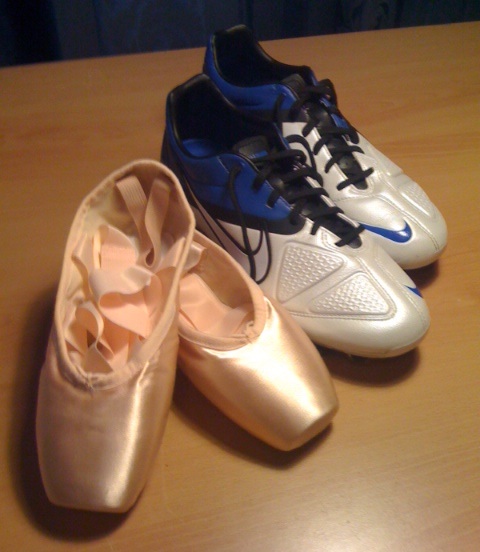 Last week I went shopping with my 16 year old twin daughters to buy new shoes for their respective hobbies: ballet pointe shoes for one daughter and soccer boots for the other. I rather loved that outing because it was such a confirmation of our trust in our kids.
Last week I went shopping with my 16 year old twin daughters to buy new shoes for their respective hobbies: ballet pointe shoes for one daughter and soccer boots for the other. I rather loved that outing because it was such a confirmation of our trust in our kids.
Having twins brings up all sorts of issues that we don’t have to consider with children that come by-one-one. In particular, their individuality. Does one deliberately put twins into different classes and hobbies, or even schools, so that they develop their individuality, or does one allow them to decide how soon they are ready to diverge?
As we were home educating, our daughters were ‘lumped together’ all the time. They had the same group of friends, the same experiences, the same ‘classroom’, the same ‘playground’, the same ‘teacher’… Would all of this sameness stifle them or cause them to, well, homogenise?
When they were infants I was always very particular about dressing them in different colours and outfits so they would be individuals rather than a matched pair. In fact, I rather cherish a childhood moment when, as very little children, they came running to me in similar clothes, having dressed themselves, and declared, “Mum! We look like twins!”
So, as our educational choice to home educate kicked in and they were increasingly spending time in each other’s company and sharing the same experiences, I did wonder on occasion if we ‘should’ have engineered different directions for them. After all, they were clearly very close, to the point that they seemed to view the other as an extension of self rather than as someone else.
However I don’t know why I ever worried about this. From the moment that they were born we were struck by how different they ‘felt’; one daughter was energetically quite light and the other was more ‘earthed’. (Their step-grandmother tuned into this dynamic as well, presenting us with guardian angel cards after they were born that perfectly matched what we were sensing.)
Despite their intensely shared lifestyle, one daughter has, from toddler age, been quite sports-oriented and the other has been more inclined to draw, sing, muck around on the piano, dance… The sporty (‘earthed’) daughter decided she wanted to play footy when she was nine, and the only option was an all-boys team. She joined and dancey (‘light’) sister went with her, loyally, reluctantly. After one season dancey daughter threw in her footy boots (it was too cold in the early mornings and evenings for her), and sporty daughter continued alone. Some time later the interest in dance crystallised and they are now both firmly on their paths, appreciating each other’s skills and interests but quite clearly following their own stars.
And so each daughter is ‘individuating’ beautifully, in her own time, without having been rushed or managed.
I rather love this confirmation that we can trust our children to find their way. It’s not always easy, especially in today’s hurried world where there seems to be more and more pressure to achieve at younger and younger ages. The Latin meaning for the world educate (or educare), is ‘to draw out’, which means that we don’t need to stuff our children full of information and instructions; their innate wisdom will recognize the directions they need to take and they will unfold their gifts and their purpose in perfect timing.
So if your children don’t seem to be developing fast enough or showing any particular talents, relax, wait, trust… All in good time.


Recent Comments